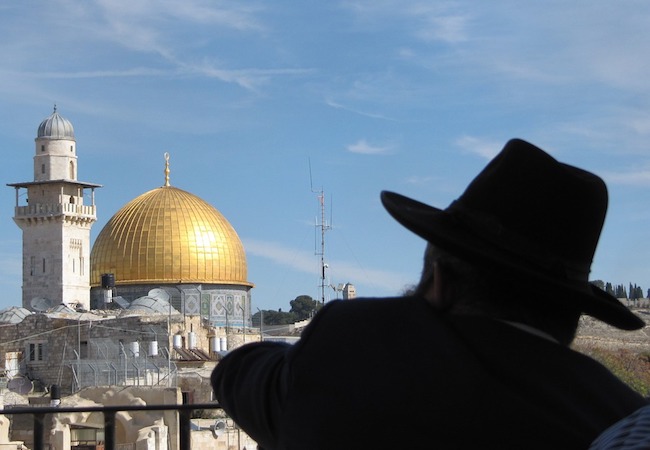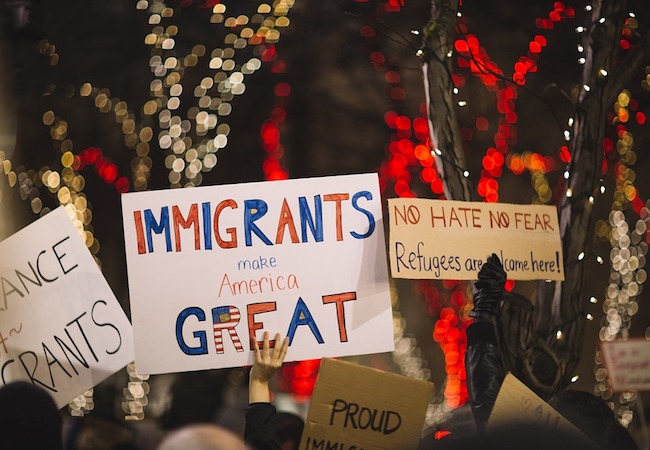The role of women in development: Towards a thriving society uncovering the past, building the present, and moving towards the future in Saudi Arabia
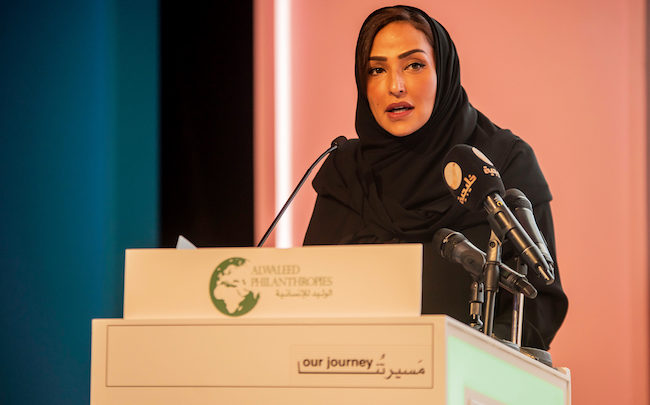
By Alexander Woodman
Gender statistics are recognized as the vital factor while designing data policies for gender equality and women empowerment globally. Launched in 2016, the UN Women flagship program, “Making Every Woman and Girl Count,” was created to investigate how gender statistics are collected and used. The five-year-long program was targeted to improve the use of these statistics to improve the gender equality obligations in the 2030 Agenda for Sustainable Development. The governments of Australia, Ireland, Mexico, the United Kingdom, the United States of America, and the Bill & Melinda Gates Foundation were among the supporting members of the UN Women program.
On September 26, 2018, two years after the formation of this initiative, Alwaleed Philanthropies’ Secretary General, Her Royal Highness Princess Lamia bint Majed Al Saud signed a pact which joined the “Making Every Woman and Girl Count” initiative with the UN Women Executive Director Phumzile Mlambo-Ngcuka. At this event, HRH Princess Lamia stated: “At Alwaleed Philanthropies, we strongly believe that it is only through strong and effective collaboration, that we can build a more tolerant, prosperous, and accepting world.”
With this new pledge, Alwaleed Philanthropies, UN Women, the General Statistics Authority of Saudi Arabia (GASTAT) and the National Observatory for Women (NOW)and King Saud University, began the task of data collection. It focused on the participation of Saudi women in the development and business of the Kingdom. This was the first attempt to study gender statistics in Saudi Arabia and the Gulf Cooperation Countries (GCC) and would be used in the presentation of Vision 2030.
The data collection had fifty-six items used to measure women’s involvement that included five pillars. They included were economic, health, education, legislation, and social. Each pillar was designed to match the local situation of each participant. The fifth social pillar was added to correspond with the objectives of the frameworks of Vision 2030. The hope was to record these statistics related to female participation and their inclusion in the advancement of the Kingdom.
The results of the study were evaluated with the use of the official records collected by GASTAT along with the data collected from 15,000 households in Saudi Arabia. The findings were ranked with a value between zero and one. Any score that was closer to a grade of one indicated a smaller gender gap.
The findings of this outstanding initiative were announced at a Conference entitled “The Role of Women in Development: Towards a Vibrant Society.” The Conference, held in Riyadh last month in the presence of the UN Women, the National Observatory for Women of the King Saud University (NOW), the General Statistics Authority of Saudi Arabia (GASTAT), and Alwaleed Philanthropies. Many were in attendance, including the authorities from the Kingdom’s government, those in the academic and philanthropic community, and a large gathering from the private sector who were among the honored guests of the evening.
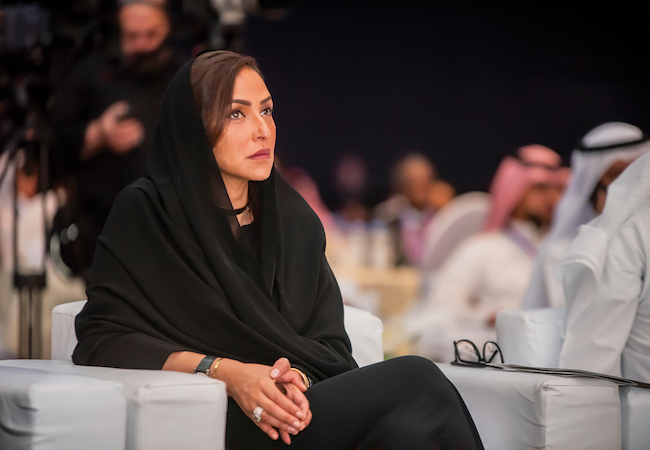
I had an exclusive opportunity to set down with Her Royal Highness Princess Lamia Bin Majed Al Saud and talk about gender parity and women empowerment in Saudi Arabia.
A.W. Your Highness, can you discuss the role and participation of Alwaleed Philanthropies at today’s Conference: “The Role of Women in Development: Towards a Vibrant Society”?
HRH Princess Lamia. Let me begin by saying that this conference; “The Role of Women in Development: Towards a Vibrant Society” is a long-awaited dream, that for many of us has finally come true.
The main goal of this initiative is a more in-depth comprehension of the roles, activities, limits, and obstacles of Saudi women in the world today. The information presented here will serve as a foundation on which we can move forward and reduce the gap between the genders within the workforce. We also hope to improve the need for the empowerment of women.
Speaking of Alwaleed Philanthropies, I would like to mention that our partnership with many countries overseas is clearly one of the main pillars, of the work and accomplishments of Alwaleed Philanthropies. 10 amazing Saudi women lead and personally coordinate over 50 projects in more than 180 countries. They have shown, and we believe strongly that lofty goals are not without a strong partnership and collective solidarity.
Therefore, in the interests of these goals, Alwaleed Philanthropies, UN Women, the General Statistics Authority of Saudi Arabia (GASTAT), the National Observatory for Women at the King Saud University (NOW), and initiated this program of statistics collection to achieve the main goals of our company. Those two primary goals are to combine efforts with the rest of the world and increase the involvement of women in many new, different, and challenging fields of activities.

A.W. When you speak about the need to improve the role and image of Saudi women in society, several issues that emerge: their right to work, their motivation, and how they are perceived by foreigners. How can these factors be discussed in a positive manner to enlighten others and prove that negative perceptions of foreign people are, in fact, incorrect?
HRH Princess Lamia. I believe that we should never focus on the negative aspects of an issue. The support and cooperation we have received from the government, as well as the enthusiasm displayed by the female audience at this conference, has kept Saudi women motivated to achieve their dreams. In my opinion, it is more important that the results of this research have a positive impact on our female citizens. Our focus is to continue to help guide our success rather than focus on how we are perceived by the world. Although these numbers show progress, we know that we have work to do and have not solved all of the issues. We will continue to focus on our support and the remarkable achievements of Saudi women.
A.W. Can you discuss the cooperation of the government and other organizations that have continued to work to overcome those issues that need work to reach more positive results?
HRH Princess Lamia. A partnership is a prominent feature leading to the success of any project. The vision of His Royal Highness Prince Alwaleed is built on a partnership, and that makes our goals exceptional. My call goes out to all governmental and non-governmental agencies to join us and use their unique talents to achieve extraordinary results.
Supporting Women’s Empowerment in the Kingdom of Saudi Arabia
Based on a survey conducted by “The Participation of Saudi Women in Development Study,” using the GPI (Gender Parity Indicator) as an indicator for participation gap, Figure 1shows a high overall disparity between men and women with quasi-absence of women in Legislation (very low GPI) along with their weak participation in Social and Economic (low GPI). However, their contribution in Education and Health was found to be slightly lower than that of men (GPI close to 1).
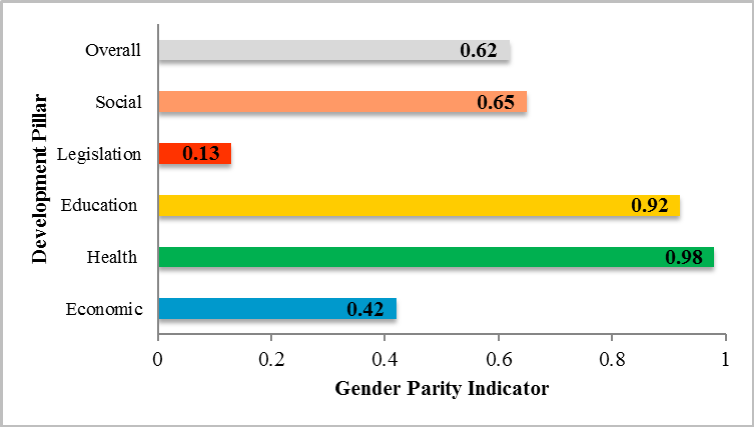
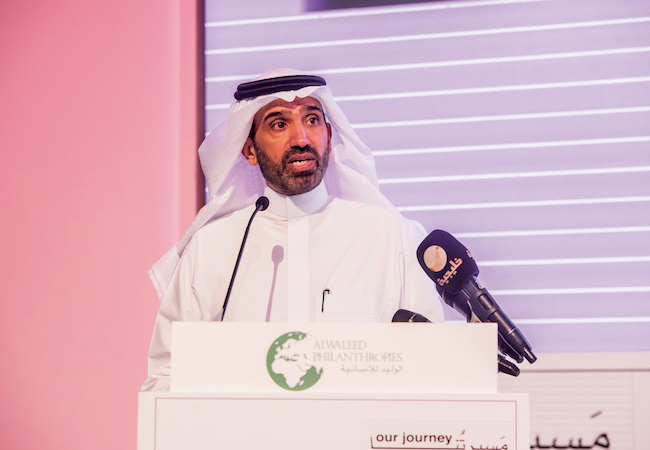
His Excellency Ahmed Bin Suleiman Al Rajhi, the Minister of Labor and Social Development of the Kingdom of Saudi Arabia
His Excellency Ahmed Bin Suleiman Al Rajhi emphasized that the Kingdom of Saudi Arabia continually supports and empowers women to realize their vision and to create a more contemporary society with a clear path for future development.
The cooperation of Alwaleed Philanthropies, UN Women, the General Statistics Authority of Saudi Arabia (GASTAT) and the National Observatory for Women (NOW) as well as King Saud University, resulted in the increased knowledge about the positive integration of Saudi women in different sectors of our country. This conference presented an opportunity to witness the power and intelligence of Saudi women in many fields. It displayed their success in science and economics as well as in the educational research system. Their work reflects on the efforts of a new generation and its achievements in the power and success of women. The excellent work of these ten women, employed at Alwaleed Philanthropies, is a true example of the accomplishments and future possibilities of the work of woman all over the world when they are given opportunities.
One of the goals of the Ministry of Labor is to work on behalf of the needs of the residents. One of the issues is women empowerment which is a vital part of Vision 2030. To encourage women to increase their productive growth, the Ministry of Labor created the Council of Family Cases. This organization considers women and their rights as their highest priority. The establishment of a Family Council within the Ministry will help to research the most pressing women’s issues and will focus on finding solutions with community support. This work will be done in accordance with Islamic teachings.
His Excellency expressed his hope for further expansion of the women empowerment program. His goal is to work in collaboration with International and community organizations who will share this incredible experience of success.
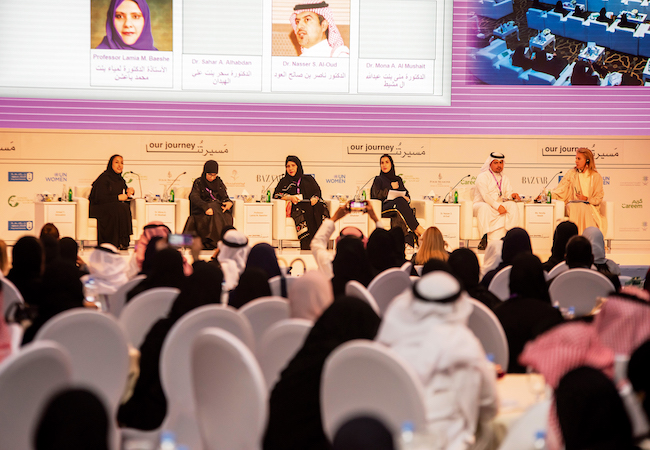
Ms. Amaal Almoalimi, the Council Member of the Saudi Human Rights Commission
Ms. Amaal Almoalimi, a Council Member at the Saudi Human Rights Commission, mentioned in a speech at the Conference that “The Role of Women in Development: Towards a Vibrant Society” deserves all of the appreciation and support they receive from the global community.
She stated that when embarking on this new journey of involvement with the UN Women project, Saudi women have shown tremendous support, offering to provide information about their experiences and working as volunteers on all stages of any project they take on.
Since the launch of Vision 2030, the global community has witnessed many positive changes in the entire Saudi society. All of these changes had direct involvement with Saudi women. Ms. Almoalimi was enthusiastic to see a ballroom filled with women from different walks of life. She felt that this was evidence that women empowerment is on the rise and is accepted by the female population. Furthermore, she believes that this is an actual realization of Vision 2030.
*Dr. Nizar Jaoua is a French statistician consultant based in GCC
*This post contains affiliate link(s). Click here for Affiliate Disclosure.



